The controversy surrounding the selection of Puja Khedkar, the trainee IAS (Indian Administrative Service) officer of the Maharashtra cadre, who allegedly availed of concessions for physical disability and OBC (Other Backward Classes reservations), has sparked a furious debate online on reservations for the disabled in India’s elite civil services.
Following various revelations of alleged impropriety in the media, her two-year training has been put on hold, and her selection into the IAS is now being probed by a panel set up by the Union Government. What this decision hasn’t done is lessen the volume of those questioning the need for a disability quota in the elite civil services given their concerns of ‘misuse’.
The Indian Constitution guarantees equal rights and opportunities for the disabled, recognising those persons with 40% or more disability certified by medical experts.
This includes everything from hearing impairment to visual impairment, blindness, and locomotive disabilities. Under the Disability Discrimination Act, 1995, a 3% reservation is provided for the disabled. This law was replaced by the Rights of Persons with Disabilities Act, 2016, which increases reservations to 4% for Persons with Disabilities (PwD) in various sectors, including those attempting the UPSC Civil Services Examination (CSE).
Earlier this week, senior IAS officer of Telangana cadre, Smita Sabharwal, wrote a post on X questioning the provision of reservations for disabled persons in the civil services. She posed on X: “With all due respect to the Differently Abled. Does an Airline hire a pilot with [a] disability? Or would you trust a surgeon with a disability. The nature of the #AIS (IAS/IPS/IFoS) is field-work, long taxing hours, listening first hand to people’s grievances-which requires physical fitness. Why does this premier service need this Quota in the first place!”
Even Amitabh Kant, an ex-civil servant and former CEO of NITI Aayog, sought a review of the disability quota. He posted on X: “Several cases of fraud through UPSC for entry to top Civil Services are being alleged. All such cases must be fully investigated and the sternest action taken. Selection on the basis of competence and integrity should never get compromised.”
“I am in favour of SC/ST and OBC reservation. These reservations should continue, with the Creamy layer regulations being enforced. However, the existing reservations for the physically and mentally handicapped and the proposed 1% reservations for the third gender for the top Civil Services need to be reviewed. They are being misused,” he added.
As a trustee of @ncpedp_india, we see thousands of innovative outcomes by people with disabilities, which is inspirational in many ways. NCPEDP was instrumental in getting disabled people in UPSC & we see them struggling daily due to lack of awareness. If given a universal… https://t.co/M6TUgDSIUY
— Arvind Gupta (@buzzindelhi) July 21, 2024
‘We need disability quota’
Speaking to The Better India, Satender Singh Pannu, a visually-impaired civil servant who is currently undergoing training at the Directorate of Training (Union Territories Civil Services), says that the arguments that question the need for a disability quota are misplaced.
Such opinions, he argues, have four profoundly disturbing problems:
1) They’re ableist in nature.
2) It’s a denial of enabling conditions and affirmative action.
3) These views go against constitutional guarantees.
4) It’s a denial of social justice and the principle of reasonable accommodation.
Elaborating on the first point, Satender says, “Such opinions exhibit an ableist point of view, which believes that people with disability are incompetent and incapable of performing the tasks that they are supposed to perform as IAS officers. But there are civil servants availing of the disability quota who have done better than their ‘able-bodied’ peers in their various revenue postings. As DMs or SDMs, they have shown to be more than capable of going on field visits, listening to public grievances and fulfilling all other tasks expected of them.”
Speaking on his own experience, Satender notes, “Affirmative action has definitely acted as an enabler. As a civil servant, I’ve had the opportunity to work in different roles. There’s a perception that a person with a visual disability will struggle to work as an effective officer, which is absolutely untrue. Seldom do people know the role of technology like screen reading software, text-to-speech technologies, and text reading technologies, which can even read handwriting, and artificial intelligence (AI) to assist officers like us. These technologies and my own slight adjustments and adaptations have ensured that I’m as competent as anybody else.”
Coming to the second point, he also believes that such arguments also reflect the denial of enabling conditions and the project of social inclusion.
“Disability has nothing to do with stamina or competence. For people from excluded communities, what matters is the provision of conditions that will enable them to thrive. We need enabling conditions to overcome caste, class and other such social constructs,” he says.
“We strive to eradicate caste through affirmative action. Similarly, we need enabling conditions for the disabled so that society can step out of its ableist mentality. They should not be excluded from service just because they happen to be victims of social structures, prejudicial benefits and inaccessible attitudes. We need to be provided with attitudinal, structural and institutional accessibility for us to perform our role as officers,” he adds.

Satender also believes that the real issue is being lost amidst all the noise surrounding the Puja Khedkar controversy. As he argues, “This is a distraction from the real issue. It’s not about scrapping affirmative action for the disabled. The real issue is to implement it properly. Reservation has not been implemented in its true spirit, and now we have forgery, deception and fake certificates that eat into it. This should be talked about and rectified. We should not throw the baby out with the bathwater. Everyone deserves a chance to live with dignity, including a disabled person, and this is their constitutional right.”
The Government of India has committed to providing the disabled with all the rights enshrined in the Rights of Persons with Disabilities (RPWD) Act, 2016, the United Nations Convention on Rights of Persons with Disabilities (UNCRPD), and other such covenants.
“Nobody should exclude someone from a responsibility they’re competent to execute if they satisfy all the required conditions. People who have availed of the disability quota have cleared the civil service examinations (CSE). They have cleared the same exam as able-bodied people who are talking about scrapping reservations for the elite service. Scrapping something like the disability quota goes against their rights, dignity, and social justice,” he says.
Finally, on the fourth point, Satender argues, “We must note that we have already identified services in which people with disabilities can perform well, and the IAS is one of them. This has been done following the principle of reasonable accommodation. We have not identified flying an aeroplane or the responsibility of an IPS officer for the visually impaired. The roles that have already been identified and considered suitable for visually impaired persons should not be denied to them, in which they have already established themselves.”
Do we need a review of the disability quota?
Satender doesn’t believe that we need to review the reservation quota for the disabled.
“Just because some facility is being encroached upon, you do not end it. You punish the encroachers and proactively plug the loopholes to allow genuine candidates to use the facility. Reservation for people with disabilities needs to be implemented in its true spirit,” he says.
Meanwhile, a former decorated IAS officer who also availed of the disability quota but wishes to remain anonymous says, “I’m actually shocked that she [Puja Khedkar] could bypass all the checks. I am actually puzzled how these people can actually get through it. The vetting process for candidates availing the disability quota needs to be a lot more stringent.”

“You cannot question the spirit of the quota. It should remain to ensure that disabled people are brought into the mainstream of the Indian bureaucracy. But the way it’s being implemented needs to change and this doesn’t require earth-shattering reforms. All you have to do is to ensure that people who are there conducting this examination are held accountable. What we need here is simple tweaks and basic accountability. It’s not difficult at all,” he adds.
Barriers to entry
Amidst all the noise, a major issue that is being missed is the denial of opportunities to disabled candidates who have cleared the exam but are either inducted into a service that they haven’t sought or not inducted at all.
Take the example of 2003-batch IAS officers Rigzin Samphel (UP cadre) and DS Lokesh Kumar (Telangana cadre) who had to file a case in a court before the Prime Minister’s Office (PMO) intervened on their behalf to get their preferred service (IAS) allotted to them. Samphel, a 2003-batch officer with All India Rank (AIR) 120 and AIR 2 (Scheduled Tribe), was also eligible for the disability quota (locomotor) given his severely damaged right leg. Lokesh was eligible for the same quota after contracting polio on one leg at a young age.
By virtue of being an ST (Scheduled Tribe) candidate, Samphel should have been given the IAS since that year there were six seats available for ST category candidates. Even if he was denied all reservation quotas, the Government should have inducted him into the IRS since he had finished AIR 120 (General category). Instead, he was allotted the Indian Information Service (IIS) by the Department of Personnel and Training (DoPT).
Their (DoPT) reasoning was that they wanted to promote disabled people in the services, and there were seats specifically reserved for them in the IIS but not the IAS. In response, Samphel and Lokesh told the DoPT that they didn’t want reservation under the disability quota and that they should have been allocated the IAS by virtue of their performance in the exam.

Lokesh, AIR 122 and AIR 6 (Scheduled Caste), was eligible for IAS since that year, there were eight seats available for SC category candidates. Hurt by this injustice, Samphel and Lokesh filed a case in 2003 in the Delhi High Court saying they did not want the benefit of reservation under the disability quota because it was being used against their interest. By virtue of their own merit, they were getting into the service of their choice (IAS), but the rules listed in the Disability Act, 1995, were being used in an ‘illogical manner’ to deny them entry into the IAS.
Along with their case, however, there was a separate PIL (public interest litigation) filed by two judges of the High Court who happened to read about their case in the media. Concurrently, Samphel and Lokesh went about pursuing their own case through the then Ladakh MP Thupstan Chhewang and they approached the PMO for their assistance.
As luck would have it, the PMO was benevolent towards their cause and ordered a second medical examination to see whether they were fit to serve in the IAS or not.
The DoPT reconstituted a medical board in 2004 to assess whether they were capable of carrying out the demands of the IAS in terms of physical fitness. After putting Samphel and Lokesh through various tests, they decided that both of them were fit for all non-technical services and therefore should be inducted into the IAS. From the time they had filed the case till its resolution, they were serving as probationers in the IIS, partially under duress.
Despite this resolution, there was another PIL filed in the Delhi High Court as stated earlier. This PIL snowballed into many questions from the court about the Government’s position on disabled candidates serving in the elite services. Finally, in 2005, the DoPT issued a circular saying that seats would be reserved for disabled people in the IAS.
Both Samphel and Lokesh have built stellar careers in the service with the former taking voluntary retirement last year. Their ‘disability’ didn’t come in the way of their ability to serve. Despite the examples they’ve set, the system seems determined to keep deserving disabled candidates out of the higher echelons of the Indian bureaucracy.
A must read inspiring journey of a differently-abled IAS officer of Telangana cadre –
— Naveena (@TheNaveena) July 23, 2024
In the year 2003, a UPSC AIS aspirant worked hard & secured a good rank . But instead of IAS posting, he was given IIS posting because of his disability. There were 2others along with him,… pic.twitter.com/5O6iUPzO1K
Take the example of Ira Singhal, a 2015-batch IAS officer with hyperkyphosis scoliosis, a spine-related disorder, who topped the civil service examinations in 2014.
Four years prior to this phenomenal achievement, she had scored enough to make it to the IRS, but her appointment was cancelled with the Government citing her disability as a reason. She then sought legal intervention from the Central Administrative Tribunal (CAT). Just as she was on the cusp of appearing for her second attempt, she received her letter of appointment but still went ahead with writing the exam and came back much stronger, according to an India Today report.
More recently, you have the case of ISRO scientist Kartik Kansal, who suffers from muscular dystrophy and as a result, has been confined to a wheelchair since he was 14. Despite clearing the UPSC exam four times, he has not yet been allocated a service.
According to an Indian Masterminds report, “So far, Kartik has made a total of six attempts at the UPSC exam, successfully clearing it four times. His All India Rank (AIR) was 813 in 2019, improved to 271 in 2021 (his best rank so far), followed by 784 in UPSC-2022, and 829 in UPSC-2023. Despite these achievements, he has not been allocated a service in three of his successful attempts, and for the fourth attempt in 2023, service allocation is pending.”
His case is currently pending before CAT based on his 2021 result.
“According to the DoPT, the [2021] notification specifies muscular dystrophy as an eligible condition for persons with disabilities in the IRS service category. However, Kartik’s condition, affecting both legs and both arms (known as Primary Lateral Sclerosis or PLS), is categorised differently and is recognised under IAS but not under IRS,” the report noted.
“Therefore, the DoPT argues that since the IRS does not include a category specifically for both legs and both arms disability, Kartik cannot be allocated this service despite his qualification under the broader disability category of muscular dystrophy. Kartik cannot be allotted the IRS service due to this mismatch in disability category specification,” the report added.
Kartik met all the physical requirements to get into the IRS. But he fell afoul of a technicality, which doesn’t conform with logic. Why should his condition be recognised under the IAS but not the IRS? It’s tough to make sense of this situation.
Thus, we are left with a situation where candidates allegedly engaging in forgery and deception are availing the benefits of the disability quota whereas deserving ones are getting left out in the cold. Maybe, instead of wanting to scrap or thoroughly review the requirement for it, the system would be better placed to hold its examiners more accountable and fix the loopholes.
(Edited by Pranita Bhat; Images courtesy Satender Singh and Shutterstock)
No comments:
Post a Comment